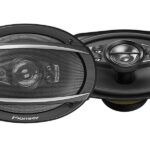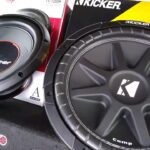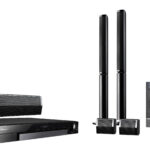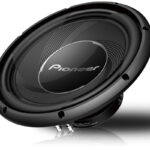An amplifier in a car boosts the audio signal from the radio, allowing for louder and clearer sound output. Car amplifiers enhance the audio quality and volume in your vehicle, providing a more immersive and enjoyable listening experience.
By amplifying the weak audio signal from the radio, amplifiers ensure that the audio is robust enough to power the speakers and fill the car cabin with sound. Whether you’re a music lover or simply want to improve your in-car entertainment, adding an amplifier to your car audio system can make a significant difference in the overall audio quality.
This article will explore in more detail what an amplifier does in a car, its benefits, and how it integrates with your car’s audio system. So, let’s dive in and learn how an amplifier can transform your in-car audio experience.
What Is An Amplifier?
Amplifiers play a crucial role in enhancing the audio experience in your car. These devices are designed to amplify the audio signals received from the car stereo system. In simple terms, an amplifier increases the power of the audio signals and delivers them to the speakers, allowing you to enjoy better sound quality.
Amplifiers use a variety of electronic components and circuits to perform this task. They receive low-power audio signals from the source, such as a radio or CD player, and convert them into high-power signals that can drive the speakers effectively. By boosting the signal strength, amplifiers ensure that the audio is clear, loud, and has sufficient volume to overcome any background noise or distortion.
Car audio enthusiasts often use amplifiers to improve the overall sound quality, enhance bass response, and reproduce audio with greater accuracy. Amplifiers come in different types, including mono, stereo, and multi-channel configurations, catering to various car audio setups and preferences.
Why Do You Need An Amplifier?
A car amplifier plays a crucial role in enhancing sound quality and overall audio experience. It is an essential component of your car’s audio system, ensuring that the music sounds crisp, clear, and powerful. With an amplifier, you can enjoy a fuller range of frequencies and improve the sound stage in your car.
One of the main reasons you need an amplifier is to overcome sound distortion. A good amplifier helps in reducing distortion and reproducing sound accurately, even at high volumes. It ensures that every note, beat, and lyric is heard with precision, without any unwanted noise or distortion.
Additionally, an amplifier enables you to achieve louder volumes without sacrificing sound quality. If you want to enjoy your favorite music at higher volumes without any distortion or loss of clarity, a proper amplifier is a must-have. It provides the necessary power to drive your speakers, allowing you to experience music in all its glory.
Choosing The Right Amplifier For Your Car
An amplifier is an essential component for enhancing the audio system in your car. When selecting the right amplifier, two crucial factors to consider are power output and RMS ratings. **Power output** determines how loud your audio system can go, so ensure that the amplifier’s power matches the needs of your speakers. The **RMS rating** or continuous power handling represents the amplifier’s ability to deliver a consistent power output.
Another important consideration is the **compatibility** of the amplifier with your speaker system. Make sure the amplifier’s impedance range aligns with your speakers to avoid any connectivity issues or damage to your equipment.
Additionally, you need to choose between **compact and full-size amplifiers**. Compact amplifiers are smaller and suitable for limited installation space, while full-size amplifiers offer more power and flexibility. Consider the available space and your desired audio setup when making this decision.
Understanding Amplifier Installation
Amplifiers play a crucial role in enhancing the sound quality of your car’s audio system. Before diving into the installation process, it’s essential to adequately prepare. This involves gathering the necessary tools such as a wiring kit, wire cutters, and a voltmeter.
Connecting the amplifier to the receiver is the next step. The receiver, also known as the head unit or stereo, serves as the control center for your car audio system. To establish a connection, identify the preamp outputs on the receiver and use RCA cables to plug them into the corresponding inputs on the amplifier. This allows the amplifier to receive signals from the receiver and amplify them.
Wiring the amplifier to the car’s speaker system is the final step. Using speaker wires, connect the amplifier’s output channels to the respective speakers. Pay attention to matching polarities to ensure proper phase alignment and prevent audio distortion.
By understanding the amplifier installation process and following these steps meticulously, you can enjoy a powerful and immersive audio experience in your car.
Common Amplifier Issues And Troubleshooting
An amplifier in a car is responsible for boosting the audio signals fed by the head unit to power the speakers. However, like any other electronic device, amplifiers can encounter issues that affect their performance. Two common problems with car amplifiers are overheating and fuse blowing.
Overheating can occur when the amplifier is pushed beyond its limits or when it is not properly ventilated. This can lead to distortion, reduced power output, and even permanent damage. To address overheating, ensure that the amplifier is installed in a well-ventilated area, away from heat sources, and consider using a fan or heat sink.
Fuse blowing is another concern, which is often caused by electrical issues such as short circuits or incorrect wiring. It is essential to ensure that the amplifier is properly grounded and wired to avoid these problems. Regularly check the fuse rating to match the amplifier’s power requirements and consider using a circuit breaker for added protection.
Additionally, grounding and noise elimination techniques are crucial in achieving optimal sound quality. Properly grounding the amplifier can reduce unwanted noise and interference in the audio system. Utilizing noise filters or suppression devices can further enhance audio clarity.
| Common Amplifier Issues | Troubleshooting Techniques |
|---|---|
| Overheating | Ensure proper ventilation and consider using a fan or heat sink. |
| Fuse Blowing | Check wiring, grounding, and use appropriate fuse ratings or circuit breakers. |
| Grounding and Noise Elimination | Ensure proper grounding and explore noise filters or suppression devices. |
Amplifier Maintenance And Care
An amplifier in a car is responsible for enhancing the audio signals that are sent to the speakers. It boosts the power of the signals, allowing for louder and clearer sound. To ensure the proper functioning and longevity of the amplifier, maintenance and care are essential.
Cleaning and Dust Removal: Regularly clean the amplifier to remove dust and dirt. Use a soft, dry cloth or a brush to gently wipe away any debris. Be careful not to use any harsh chemicals or abrasive materials that could damage the amplifier.
Checking and Replacing Components: Periodically check the amplifier’s components, such as fuses and wiring, to ensure they are functioning properly. If any components are damaged or worn out, they should be promptly replaced to avoid further issues.
Preventive Measures for Longevity: Take preventive measures to prolong the life of the amplifier. Avoid exposing it to extreme temperatures or moisture. Park the car in shaded areas when possible. Additionally, ensure that the amplifier is installed in a well-ventilated location to prevent overheating.
Conclusion
To summarize, amplifiers play a crucial role in enhancing the audio experience in car audio systems. By boosting the signal strength, amplifiers ensure that the music reaches all the speakers with clarity and power. Whether you enjoy thumping bass or crisp vocals, amplifiers deliver the desired sound quality.
Understanding the role of amplifiers helps you make informed decisions when it comes to upgrading your car’s audio system. Embrace the power of amplifiers and elevate your driving experience to the next level.
Frequently Asked Questions On What Does Amplifier Do In Car
What Does An Amplifier Do In A Car?
An amplifier in a car boosts the audio signals from the receiver or head unit and delivers more power to the speakers. This ensures that the sound reproduction is clear, loud, and of high quality, especially at higher volumes. Amplifiers also improve the overall dynamics and audio experience in a car.
How Does A Car Amplifier Work?
Car amplifiers take the low-level audio signals from the receiver or head unit and increase their power, allowing them to drive the speakers effectively. They use electronic circuits to amplify the voltage and current of the audio signals, enabling them to produce a louder and cleaner sound.
This results in improved audio performance in the car.
Why Do I Need An Amplifier In My Car?
An amplifier is necessary in a car audio system to provide more power to the speakers. It helps overcome the limitations of the receiver or head unit, which may not have enough power to drive high-quality speakers. An amplifier ensures that the audio signals are amplified properly, resulting in better sound quality, increased volume, and enhanced bass response.
Can I Install An Amplifier In Any Car?
Yes, amplifiers can be installed in most cars, regardless of the make or model. However, the installation process may vary depending on the car’s electrical system and available space. It’s important to choose an amplifier that matches your car’s electrical capabilities and speaker requirements.
Professional installation is recommended to ensure optimal performance and safety.








